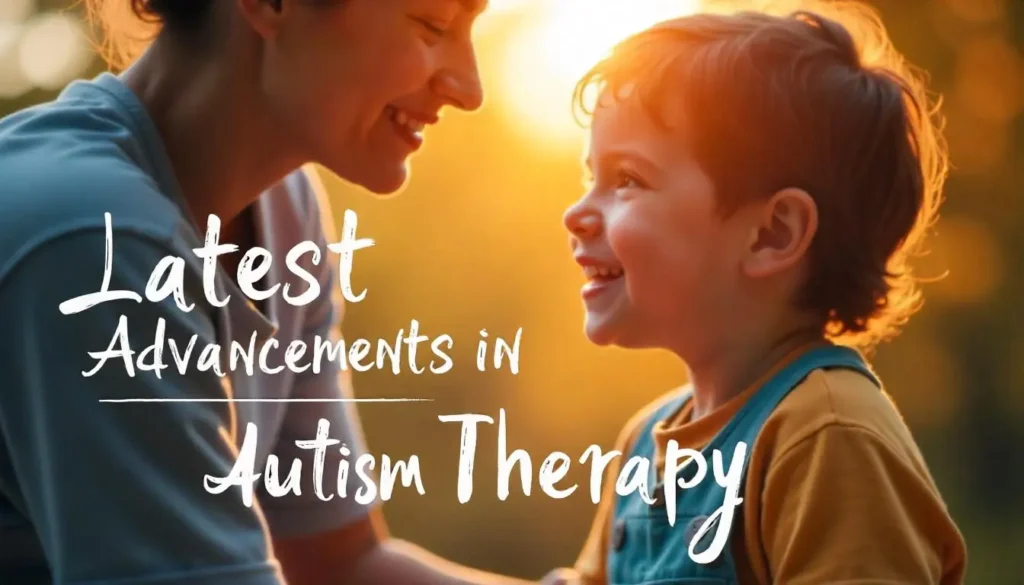Latest Advancements in Autism Therapy: 2025 Trends to Watch
As our understanding of autism continues to grow, so do the treatment methods designed to support individuals on the spectrum. In 2025, the landscape of Autism Therapy is being reshaped by innovation, data-driven insights, and inclusive technology. From AI-powered learning tools to immersive virtual experiences, the advancements in Autism Therapy are more personalized, accessible, and effective than ever before.
Whether you’re a parent, educator, or therapist, staying updated on these Autism Therapy trends for 2025 can empower you to make informed decisions that best support your child’s development.
What Are the Latest Advancements in Autism Therapy for 2025?

The year 2025 has introduced several new Autism Treatment methods that go beyond traditional behavioral therapy. These include:
- AI-driven therapy tools that personalize learning
- Virtual reality programs designed for social skills training
- Telehealth therapy platforms offering broader access
- Wearable devices for behavior and emotion monitoring
- Neurodiverse education apps that adjust content in real-time
These breakthroughs reflect a shift toward cutting-edge Autism Therapy that is more adaptable, tech-integrated, and tailored to individual needs.
How Is Technology Changing Autism Therapy in 2025?
Technology has become a central force in the future of Autism Treatment. Artificial Intelligence, machine learning, and virtual platforms are now being used to enhance both diagnosis and therapy in profound ways.
Here’s how:
- AI in Autism Therapy: Smart algorithms analyze behavioral data to predict triggers and suggest strategies, offering real-time feedback to therapists and caregivers.
- Digital Learning Platforms: Interactive games and cognitive training apps adapt dynamically to the user’s responses, helping maintain engagement.
- Sensory-Friendly Tech: Devices are now designed to reduce overstimulation and support neurodiverse learning tools through personalized settings.
These emerging therapies for autism reflect a modern, holistic approach that complements traditional interventions such as ABA or occupational therapy.
Also Read: Can ABA Be Used for ADHD or General Classroom Behavior?
Are Virtual Reality and AI Being Used in Autism Treatment Now?

Yes, both virtual reality (VR) and AI are being actively implemented in therapeutic programs across the globe.
Virtual Reality Autism Therapy
VR tools are being used to create immersive, safe environments where children can practice:
- Social interactions
- Coping with change
- Navigating public spaces
A VR headset can simulate a grocery store, classroom, or playground, allowing a child to build skills without real-world pressure.
Artificial Intelligence (AI)
AI is enhancing:
- Progress tracking through smart assessments
- Custom lesson planning
- Predictive behavior analysis
These innovations are not just future concepts, as many of them are being applied in real-time to deliver modern therapies for ASD.
What Are the Most Promising New Therapies for Autism Spectrum Disorder?
While established treatments like ABA, speech therapy, and occupational therapy remain essential, the following are emerging as top evolving Autism treatment options in 2025:
- Digital CBT (Cognitive Behavioral Therapy) tools for anxiety management
- Music and Rhythm Apps that target motor coordination and communication
- Robot-Assisted Therapy to teach social cues and emotional responses
- Biofeedback Devices for self-regulation
- Augmented Reality Games that teach problem-solving and adaptive behaviors
At AB Spectrum, we integrate these tools into personalized therapy plans, ensuring each child benefits from both innovation and evidence-based structure.
Also Read: Can Art or Music Therapy Help Children on the Autism Spectrum?
How Is Telehealth Being Used to Deliver Autism Therapy?

Telehealth has evolved far beyond video calls. In 2025, Telehealth for Autism includes:
- Live Virtual Therapy Sessions: Speech, ABA, and even play therapy delivered remotely
- Remote Parent Coaching: Guided sessions to help caregivers implement strategies at home
- Digital Behavior Tracking: Apps that log moods, meltdowns, and triggers in real time
- Therapy Portals: Secure dashboards where parents, therapists, and educators collaborate
This method is especially beneficial for families in rural or underserved areas and for those managing busy schedules or transportation limitations.
How Virtual Reality & AI Helped in Autism Treatment?
virtual reality (VR) and artificial intelligence (AI) are now actively used in Autism treatment. VR creates safe, immersive spaces where children can practice social interactions, handle changes, and navigate public places like stores or playgrounds without real-world stress. At the same time, AI helps therapists track progress, build custom lesson plans, and predict behaviors, making Autism therapy more personalized and effective than ever before.

The Role of AB Spectrum in Advancing Autism Therapy
At AB Spectrum, we are committed to integrating the latest advancements in Autism Therapy into every client’s care plan. By combining evidence-based practices with the latest in tech-enabled therapies, we create programs that are forward-thinking and family-centered.
Our services reflect the future of therapy by offering:
- Tech-integrated ABA sessions
- Parent empowerment through telehealth coaching
- Access to AI learning tools and neurodiverse apps
- Ongoing progress monitoring using data analytics
As treatment options evolve, our focus remains constant: to provide meaningful, measurable progress for every child on the spectrum.
Also Read: Autism Therapy: 15 Most Asked Questions Answered
FAQs
1. What Are the Latest Advancements in Autism Therapy for 2025?
Advancements include AI-driven tools, VR-based social training, wearable devices, and adaptive neurodiverse apps.
2. How Is Technology Changing Autism Therapy in 2025?
Technology personalizes and scales therapy through tools like AI, machine learning, and sensory-responsive platforms.
3. Are Virtual Reality and AI Being Used in Autism Treatment Now?
Yes, both are being used to improve social skills, behavior tracking, and individualized therapy delivery.
4. What Are the Most Promising New Therapies for Autism Spectrum Disorder?
Promising methods include VR, robot-assisted therapy, digital CBT, and biofeedback devices.
5. How Is Telehealth Being Used to Deliver Autism Therapy?
Telehealth enables remote therapy, parent training, behavior tracking, and access to specialists across locations.
6. Are These New Therapies Meant to Replace Traditional ABA?
No. They are designed to complement traditional therapies like ABA and speech therapy, not replace them.
7. Is There Scientific Backing for These Technologies?
Many of these tools are backed by clinical trials and ongoing research showing measurable improvements in behavior and learning.
8. How Can I Access These Advanced Therapies for My Child?
Reach out to centers like AB Spectrum that specialize in integrating modern therapies into individualized care plans.
Our Latest Blog

What is Natural Environment Teaching and Why It Works for Autism

How Verbal Behavior Therapy Helps Children with Autism Communicate Better

The Power of Play: How Play Therapy Helps Children with Autism

Why Social Skills Training Matters for Children on the Autism Spectrum

What Is Sensory Integration Therapy And How Does It Help Children with Autism?


